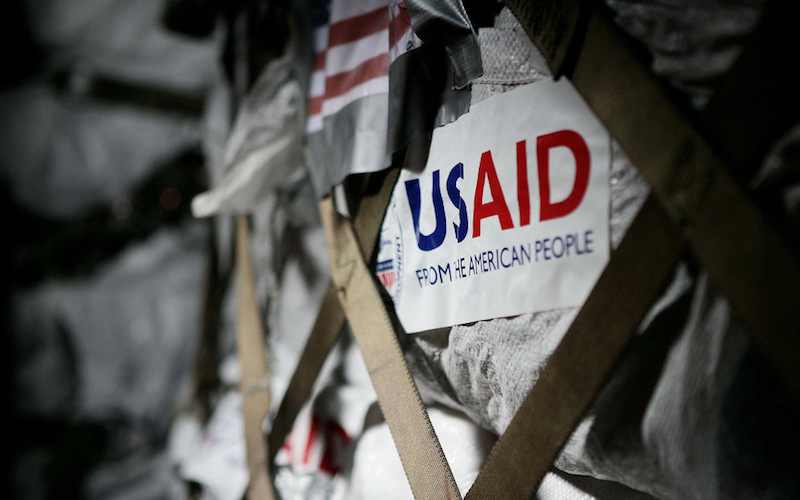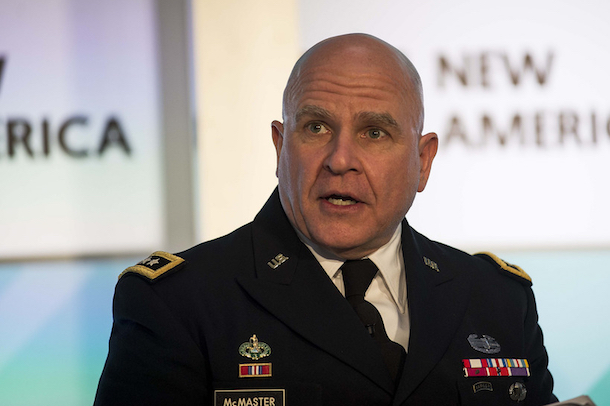
NAFTA, the State Department and USAID: What the Trump Admin Needs to Learn about Soft Power
The Trump administration is working to dismantle or diminish existing trade agreements and foreign aid programs to the detriment of United States foreign policy. Among the targeted programs are the North American Free Trade Agreement (NAFTA), United States Agency for International Development (USAID) and the office of the Secretary of State. The stated rationale for renegotiating NAFTA is that the Trump administration does not see the merit in multi-lateral trade agreements but, given the many tweets and comments made by President Donald Trump about Mexico’s “bad hombres,” the need for a wall and the crack-down on immigration, the actual motivation is skewed. As for USAID and the Secretary of State the rationale is that the monies currently budgeted could be better spent on building up the United States military.
While Mr. Trump’s “America First Foreign Policy” states that, “…in pursuing a foreign policy based on American interests, we will embrace diplomacy. The world must know that we do not go abroad in search of enemies, that we are always happy when old enemies become friends, and when old friends become allies,” the truth is that the Trump administration’s proposed budget cuts reflect a lack of understanding of the importance of soft power.
Soft power is anything short of military force or hard power to achieve an objective beneficial to the United States. Fortunately, there are seasoned military personnel, Congressional lawmakers, a few Executive Branch members, and diplomatic corps standing ready to offer assistance to prevent the United States from being further degraded internationally by the misuse or disuse of soft power.
The State of the State Department
The fiscal year 2017 State Department and USAID budget requests are approximately $50 billion, part of a broader $58.8 billion “international affairs budget,” but a pittance when compared to the $3 trillion-plus federal budget. The highly secretive Trump administration wants the State Department and the U.S. Agency for International Development to cut their budgets by at least 37 percent. Secretary of Defense General James Mattis, accustomed to speaking his mind, having been the Commander of the United States Central Command and as NATO’s Supreme Allied Commander Transformation, told Congress in 2013, “If you don’t fund the State Department fully then I need to buy more ammunition ultimately.” There has been no indication that the General Mattis position has shifted.
On February 27th 120 retired three and four star flag and general officers from all branches of the armed services, including two former CIA directors, General Michael V. Hayden and General David H. Petraeus, signed a letter directed to Paul Ryan, Nancy Pelosi, Chuck Schumer and Mitch McConnell, the House and Senate majority and minority leaders, urging them to safeguard the State Department and USAID budgets.
Quoting General Mattis, the letter further stated, “The State Department, USAID, Millennium Challenge Corporation, Peace Corps and other development agencies are critical to preventing conflict and reducing the need to put our men and women in uniform in harm’s way. As Secretary James Mattis said while Commander of U.S. Central Command, ‘If you don’t fully fund the State Department, then I need to buy more ammunition.’ The military will lead the fight against terrorism on the battlefield, but it needs strong civilian partners in the battle against the drivers of extremism– lack of opportunity, insecurity, injustice, and hopelessness.”
“It’s dead on arrival, it’s not going to happen, it would be a disaster. This budget destroys soft power, it puts our diplomats at risk and it’s going nowhere,” commented Sen. Lindsey Graham, chairman of the Senate Appropriations Subcommittee for the State Department and Foreign Operations.
The budget cuts are expected to encounter bipartisan resistance.
Less outspoken is Secretary of State Rex Tillerson, who, in Washington these days is like “finding Waldo.” In a leaked State Department memo, it is stated that Mr. Tillerson “…is deeply concerned about the timing and the size of the reductions and he will appeal to rationalize and reduce our size and structure in a manner that makes us leaner and more efficient. We intend to make the strongest argument possible in our appeal that the Department needs this additional funding to ensure the United States remains active, engaged and influential throughout the world and that any changes to our mission or way or doing business occur in the context of the National Security Strategy.”
Mr. Tillerson is said to have agreed in principle to departmental budget cuts but wants the reductions spread over three years, with only a 20 percent cut the first year, as opposed to one annual reduction.
USAID
According to the USAID website, the “USAID is the lead U.S. Government agency that works in 13 wide-ranging sectors to end extreme global poverty and enable resilient, democratic societies to realize their potential.” USAID’s activities are conducted by 14 separate bureaus and 11 independent offices engaging in a wide array of activities spread among at least 107 countries – more than one half of the United Nations members states.
USAID was designed to first and foremost support good governance. Yet the 2016 USAID budget was a whopping $22.3 billion; of which only $2.4 billion was spent on state-building and good governance. The rest was dedicated to poverty alleviation, global health, biodiversity, women’s empowerment, education, sanitation, and economic and agriculture development.
Without sustainable governance all other initiatives fail to be sustainable. Before there can be governance, there often needs to be security sector reform which trains local law enforcement and military personnel to maintain the peaceful environment necessary for self-governance. Security sector reform is an integral part of peacekeeping and peacebuilding and security conditions have deteriorated for the vast majority of recipients. Security sector reform is a function traditionally carried out by militaries or United Nations peacekeeping forces justifying organizational change.
Lessons Learned from Afghanistan
America’s presence in Afghanistan has thus far cost taxpayers $686 million. The 2016 USAID budget for all programs in Afghanistan was $1,024,314,523, a significant reduction from the 2015 budgeted amount of $3,072,502,384. This amount augments the amounts being expended by the State Department United States military, the United Nations and the European Union.
In August 2003 NATO took over for the U.S. in the United Nations-mandated International Security Assistance Force (ISAF) mission in Afghanistan that ran until December 2014. A second NATO-led mission, Operation Resolute Support, supported by 6,000 troops, was launched in January 2015 to train, advise and assist the Afghan security forces.
The U.S. is running a coordinated mission – Operation Freedom’s Sentinel – involving an additional 8,400 troops, of which 2,150 troops are counterterrorism specialists. Over the past 14 years, the U.S. Congress has appropriated more than $68 million to train, equip, and pay the salaries of up to 352,000 soldiers, the Afghan National Defense and Security Forces, and 30,000 members of the Afghan Local Police.

In addition, on October 5th, 70 international donors, including the European Union, pledged $15.2 billion or £12.3 Euros to support Afghanistan’s development until 2020. Funding for the Afghan military was an additional $5 billion annually. This contribution was made with the hope that Afghan refugees in Europe and the MENA region would have a secure home to which to return.
Despite all of these efforts there is not a stable Afghan government. The process of security sector reform was and remains far from complete making all other programs dysfunctional as their sustainability is contingent upon a reliable and stable government with law enforcement and military personnel who are effective and able to rise above pervasive corruption. Part of the problem, in a country having regional, tribal and even Sharia law was that religious, cultural and ethnic beliefs were not studied beforehand leading to incorrect assumptions as to how to engage in building a nation or nation-building that is premised on the Rule of Law.
Thus, while the 2004 Constitution created the Supreme Court of Afghanistan in Kabul which applies both new civil laws and Islamic law, depending on the case, the outlying regions, lacked an understanding of new processes, as well as trained judges and attorneys.
Only the American University of Afghanistan in Kabul offers a legal program where concepts related to Rule of Law and civil law are taught. The Afghanistan Legal Education Project (ALEP), founded in 2007 as a student-driven initiative under Stanford Law School’s Rule of Law Program, has already published six textbooks about Afghan law for Afghan audiences. In 2012 the U.S. Department of State, awarded the ALEP a $7.24 million grant to expand the textbook program and to establish a Bachelor of Arts and Law program at the American University of Afghanistan.
Even in Kabul, security is not guaranteed. On February 7th, a suicide bomber targeted judicial personnel leaving the Kabul Supreme Court on a bus at the end of the work day killing twenty people and injuring 41 others. This was not the first Taliban attack on the court and court personnel.
USAID’s website indicates that it is financing a wide variety of Afghani programs yet there seems to be nothing tying them together, least of all, a secure government. The same holds true in other countries where USAID is active.
Afghanistan is a costly lesson learned.
Changing the Organizational Structure
According to Max Boot and Michael Miklaucic of Foreign Policy, USAID is allegedly “…training security forces that can exercise a monopoly on the legitimate use of force, supporting courts that can dispense a semblance of justice, staffing a professional civil service that is not compromised by rampant corruption, and constructing financial mechanisms that can allow the state to raise and spend revenue with some degree of transparency. USAID does not, at the moment, have the necessary competency in any of these fields.”
Competence requires staffing by individuals having sufficient field experience in a particular country. USAID has been criticized for hiring individuals fresh out of school with only their Master’s degree in hand. It has been wisely suggested that the USAID hire highly trained former Army personnel.
Prior to the 2016 election it was argued that the USAID, the Millennium Challenge Corp., another government development assistance agency, along with smaller agencies like the Peace Corps, the Inter-American Foundation, the African Development Foundation, the Overseas Private Investment Corp., and the Trade and Development Agency, should be consolidated within the State Department.
Under normal circumstances the State Department is involved in soft power determinations, including aid and nation-building. However, since Mr. Trump was elected things are far from normal.
Questions have been raised as to what power if any Mr. Tillerson wields within his own department and what level of communication exists between Mr. Tillerson and Mr. Trump and his closest advisors. Based on sources close to Exxon who wish to remain undisclosed, Mr. Tillerson is well-suited for the customarily high profile role of Secretary of State.

The situation overall has deteriorated to the point that Mr. Tillerson was not even made aware that the Mexican Foreign Secretary Luis Videgaray was meeting with Mr. Trump, and his son-in-law and senior adviser Jared Kushner, National Economic Council Directory Gary Cohn and National Security Adviser H.R. McMaster. The accepted protocol is that Mr. Videgaray should have not only been greeted by Mr. Tillerson but, Mr. Tillerson should have been in attendance at all meetings.
The State Department is presently under-staffed with many key personnel having been fired or having left on their own accord. Mr. Tillerson has been unable to have his senior level personnel choices approved by the Trump administration.
Even under optimal conditions, the State Department, like USAID, is not the logical government entity to engage in nation-building, which involves peacekeeping and security sector reform. Those functions should fall under the purview of the Secretary of Defense. General Mattis has the experience to develop and implement essential and tailored nation-building and security sector programs.
The other components of soft power or aid that arise concurrently with the establishment of a sustainable government can be facilitated by the State Department. To this end, this author agrees that the myriad of remaining programs be consolidated into either the Secretary of Defense or State Department.
Changing the Focus
In addition to changing the organization structure, there needs to be a structured review of the countries presently receiving aid. It is not difficult to make the argument that Egypt, no longer the ally it once was, or Pakistan, whose corrupt military and intelligence agencies run the country with no benefit to the U.S., ought to be cut from U.S. aid programs. Conversely, it is easy to offer aid to Jordan and Lebanon, which are not only pursuing good governance, but have taken in a disproportionate number of refugees. Other countries where the expenditure of aid would be beneficial include Ukraine, Romania, and Poland, which while being protected from Russian aggressions by NATO and the U.S. are all suffering internal governance issues requiring support from the international community.
More difficult questions occur when considering Burma, the Philippines, and Israel. In the case of Burma, we are dealing with a fragile democracy that is engaged in ethnic cleansing and even the genocide of its minority Muslim Rohingya population. There now exists the potentiality that a jihadist terrorist cell could evolve, jeopardizing the region. Aid to Burma in 2016 was close to $65 million. Going forward aid should be conditional.
A similar situation exists with the Philippines, which is strategically positioned in the South China Sea and a long-term U.S. ally. But, the extrajudicial killings ordered by Philippine President Rodrigo Duterte offend not only sensibilities but are human rights violations at the very least. In 2016 the U.S. gave the Philippines $76.9 million in aid, with $4.72 million specifically earmarked for “Democracy, Human Rights, and Governance.”
Israel presents an interesting situation. We all remember Mr. Trump’s promises to broker peace between the Israelis and the Palestinians. But, when the time came all Mr. Trump had to say at the February 15th joint press conference with Israeli Prime Minister Benjamin Netanyahu was “So I’m looking at two-state and one-state, and I like the one that both parties like. I’m very happy with the one that both parties like.” Looking at that statement, the only solution both countries could like is a two-state solution as the Palestinians have no other option. While both Palestine and Israel receive U.S. aid the amount paid to the Israeli government is mind-boggling.
According to a 2016 Congressional Research Service report, “Israel receives about $3 billion in direct foreign assistance each year, which is roughly one-fifth of America’s entire foreign aid budget. In per capita terms, the United States gives each Israeli a direct subsidy worth about $500 per year. This largesse is especially striking when one realizes that Israel is now a wealthy industrial state with a per capita income roughly equal to South Korea or Spain.”
Here is the perfect opportunity to reduce the budget while conditioning future aid on peace being achieved in the Israeli-Palestinian frozen conflict. Money can melt the hearts of man, including that of Mr. Netanyahu.
NAFTA
“America First Foreign Policy” states that, “President Trump is committed to renegotiating NAFTA. If our partners refuse a renegotiation that gives American workers a fair deal, then the President will give notice of the United States’ intent to withdraw from NAFTA.”
On March 10th U.S. Commerce Secretary Wilbur Ross said that he intends to launch fast-tracked formal talks to renegotiate NAFTA. “Fast track” or a 90 day negotiating period was granted to the president by Congress to streamline the approval of trade partners with Congress having the final vote.
Since the NAFTA treaty took effect in 1994, by 2016 trade in goods between the United States, Canada and Mexico has quadrupled to $1.1 trillion. While technically a trade treaty, NAFTA has served as a form of soft power with Mexican authorities. For instance, the arrest and extradition of notorious drug lord Joaquín Guzmán Loera, known as El Chapo, could not have occurred without the assistance of Mexican authorities. There have been many other arrests of individuals in Mexico affiliated with drug cartels.
The Trump campaign was staunchly against migrants. The truth is illegal migration along the US-Mexico border is at its lowest level since 1972. To reach the United States, Central American migrants were crossing Mexico’s 750-mile border between it and Guatemala and Belize. The Mexican government accepted help from the U.S. to devise a systematized border patrol system. A year later, between October 2014 and April 2015, deportations and detentions on Mexico’s southern border drastically increased with Mexico apprehending 92,889 Central American migrants; double the 49,893 apprehended during the same period the year prior.
Mexico’s willingness to engage in these important initiatives would certainly decline or disappear should NAFTA be renegotiated in a manner placing it at a financial disadvantage. For this reason, NAFTA, as it pertained to Mexico, was conceptualized as a necessary use of soft power.

